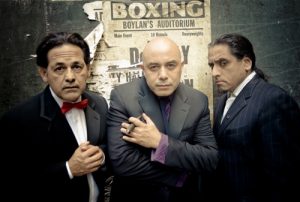Culture Clash Back in SD for “American Night”


For almost 30 years now, Richard Montoya, Ric Salinas and Herbert Sigüenza of Culture Clash have delivered on-stage history and civics lessons disguised as madcap anarchy.
Their particular brand of comedic social commentary has left audiences revolving from uproarious laughter to contemplation of pressing social problems.
The performance troupe draws its inspiration everywhere, from Shakespeare to Cantinflas, and everything is game for discussion: gender, race, politics, history.
Their unabashed approach is why Culture Clash will once again perform at La Jolla Playhouse. Culture Clash’s “American Night: The Ballad of Juan José” opens on Friday, Jan. 27. Montoya wrote and performs in the play and Jo Bonney directs.
“The Playhouse prides itself on being a safe haven for unsafe work,” said La Jolla Playhouse Artistic Director Christopher Ashley, “and few artists are as daring and dangerous as Culture Clash.”
“Their unique, take-no-prisoners style of theatre provokes both laughter in the theater and passionate debate on the car ride home,” he said.
“American Night,” which originally ran to rave reviews at the Oregon Shakespeare Festival, takes the audience on a voyage through American history while tripping through the mind of its title character Juan José, played by René Millán.
Studying for his U.S. citizenship exam, Juan José stresses out and swoons. A surreal journey from sea to shining sea ensues, through battles and plagues, into a Japanese internment camp and a music festival. Along the way he encounters the likes of Bob Dylan, Sheriff Joe Arpaio, and Fidel Castro.
“American Night is a hilarious journey through American history and an up-close look at a good man who desperately wants to be a part of this country,” Millán said about his character.
“This play does not have an agenda. It’s not trying to convince anyone to have specific political views,” he added, “but in a time when immigrants are often demonized, Juan José takes a journey that will leave audiences enlightened and inspired.”
Millán grew up in Barrio Logan and reconnected to his childhood experiences while preparing to play Juan José, he said.
Juan José is a composite of the immigrants who passed through Millan’s neighborhood. Millan remembered their stories of perilous journeys and dreams that America would make life better for the families they’d left behind, he said.
“When I was in high school, I used to ride the city bus to school an hour each way, and I remember the Border Patrol would stop the bus and have all the brown people get off to have their papers checked,” he said. “As a full American citizen myself, it was an uneasy feeling I’ll never forget.”
In writing the play, Montoya wanted to “humanize the Mexican immigrant,” he said, “as we have done with the immigrant story from other shores — Irish, Italian, Jewish, Polish.” “All have their reverent stories of great journeys and triumph,” he said. “The Mexican or Central American journey is no less harrowing, just not as romantic. But why?” he asked.
“The play looks at this and asks us to consider Juan José, the title character, as a human being, wanting to better his family and find a legal path to citizenship and sing you a song along the way,” he said.
Montoya said that all Americans should see the play and anybody who respects history will love it. “The play asks us to consider the good charity in our collective hearts — America has been so generous, but suddenly that generosity is in short supply,” he said.
“The town hall is not a place where we discuss, but yell — border militias are armed, as well as Mexican drug cartels,” he explained. “Sounds like it’s time to send in the clowns, because we could do no worse than the politicians and military.”
Montoya was born in San Diego in 1959. His father, José Montoya, is considered to be one of the most influential Chicano poets. José is a Chicano Park muralist and played a key role in the development of the Chicano art movement The Royal Chicano Air Force.
“My dad painted his mural at Chicano Park in Barrio Logan, and so the story of the Montoyas is enmeshed in the story of San Diego,” Montoya said.
He dedicates “American Night” to the son of San Diego legend Chunky Sanchez. Fernando Sanchez lost his life in a traffic accident while with a crew battling fires in Los Angeles County.
“In many ways, you could say the people of San Diego — the Chicano community — have given their lives to better California,” Montoya said. “I’m just trying to do my part.”
With San Diego and Culture Clash indelibly connected, the Playhouse is a great fit. “San Diego County, nestled directly against the border with Mexico, is incredibly varied,” Ashley said. “It is essential that the Playhouse produce theater that speaks to and about our diverse community.
“As we head into another presidential election, American Night’s laser-sharp focus on citizenship and our shared cultural identity couldn’t be more timely,” he said. “And yet there’s no one else who sees the world like Culture Clash does.”
“American Night” runs from Jan. 27 to Feb. 26. It was written by Richard Montoya, developed by Culture Clash and Jo Bonney, who also directs, and co-produced with Center Theatre Group. The play was originally produced by Oregon Shakespeare Festival. Tickets and information are available at www.lajollaplayhouse.org.






